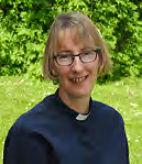Vicar's Letter
December 2017

On Sunday 3rd December, we will be holding an Advent Carol Service at St Mary's Eaton Bray. This will include music specifically for Advent, not Christmas carols. Our Christmas carol service will be held at 6pm on Sunday 17th December. 'A carol is a joyful religious song created and sung by ordinary people,' says the writer of Bethlehem Carols Unpacked. It is thought that carols originated in France, and the word comes from the Old French carole which means 'a song to accompany dancing'. In the Middle Ages in England that's just what carols were: dances accompanied by singing. At one time, there were carols for many seasons of the church's year.
In addition to Christmas and Advent, there were carols for Easter and Saints' days. Unlike in the church where everything was sung in Latin, carols were in the everyday language of the people. They included ordinary subjects like plants and animals, food and drink and were sung in the streets, in people's homes and in the inns - in fact everywhere except the church! So having carols in supermarkets is much closer to their origins than we might think.
Carol singing in the streets is one of the oldest customs in Britain. In the Middle Ages, beggars seeking food, money or drink would wander the streets singing carols. Christmas carols were traditionally confined to the period from St Thomas' Day on 21st December to the morning of Christmas Day.
During the seventeenth century, the Puritans introduced laws banning dancing and all religious feasts including Christmas. Carol singing declined and was almost forgotten until the Victorian era. The Victorians had already introduced Christmas trees and Christmas cards and in 1871, Revd H.R. Bramley and Dr John Stainer published a book called 'Christmas Carols old and new'. From that time, the popularity of carols grew and they came to be sung in church for the first time. The annual broadcast of the Festival of Nine Lessons and Carols from King's College Cambridge has become a fixture on Christmas Eve and this too helped carols to gain a wider audience.
Some of the oldest carols are still popular. Good King Wenceslas and The Holly and the Ivy can both be traced back to the Middle Ages and are amongst the oldest musical compositions still regularly sung. Many of our popular carols today are Victorian, such as Once in Royal David's City. And then there are new favourites like the Calypso Carol.
Carols help us to see religious significance in ordinary things. And that is the message of Christmas. Jesus, God's Son, was born as a baby and grew up in an ordinary family just like us. He lived as part of a community and shared in their joys and sorrows. Yet he was fully God as well as fully human, and through his life, death and resurrection he gave the promise of life in all its fullness to all who put their trust in him.
Wishing you a peaceful Advent and Christmas,
Joy (Vicar of Eaton Bray with Edlesborough)
Letter Archives
2017
- February 2017
- March 2017
- April 2017
- May 2017
- June 2017
- July 2017
- August / September 2017
- October 2017
- November 2017
- December 2017
Other Years
About the Vicar's Letter
The Vicar's Letter has been appearing in the villages Focus magazine since August 2002.
The Rev. Peter Graham also used to publish The Vicar's Letter in the parish magazine of 1964. Please see the Vicar's Letter area for these.